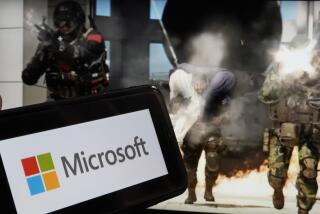Microsoft Gets Boost in Windows NT Suit
- Share via
In a court ruling that could bolster Microsoft Corp.’s antitrust battle against the government, a federal judge in Connecticut ruled that Microsoft does not immediately have to provide a software rival with access to one of its key technologies.
U.S. District Judge Janet C. Hall instead set a June 1 trial date to resolve the dispute, which centers on whether Microsoft thwarted competition by refusing to honor a licensing agreement with Danbury, Conn.-based Bristol Technology Inc. that required it to share information about its Windows NT operating system.
Bristol’s lawsuit, filed Aug. 19, is one of a handful of individual suits brought against Microsoft by competitors alleging breach of contract or anti-competitive behavior. Others were brought by Sun Microsystems Inc. over the Java programming language and Caldera Inc. over rival versions of the DOS operating system. These suits are separate from the wider federal antitrust case, but federal prosecutors have been collecting information from those cases to bolster the government’s position.
Bristol’s suit accuses Microsoft of trying to unfairly dominate the market for software for high-powered server computers that increasingly manage the Internet and other computer networks. Bristol alleged that Microsoft set burdensome terms for the renewal of Bristol’s license to use Windows NT technology.
Bristol sought a preliminary injunction to compel Microsoft to produce the information, saying it was needed to enable Bristol to develop tools for adapting Windows NT software to other computer operating systems such as Unix. But Hall refused.
Microsoft’s preliminary victory came as it prepared to return to U.S. District Court in Washington to battle antitrust charges by the Justice Department, the District of Columbia and 19 states that it is illegally protecting its Windows monopoly in personal computer operating systems.
On Wednesday, the Justice Department released written testimony from William Harris, chief executive of Intuit Corp., whose Quicken product is the leading personal finance software.
Harris alleged in his written testimony that Microsoft controls the ability of Intuit and other software makers to reach their customers. “Because the overwhelming majority of desktop PCs use Windows as the operating system to run the computer, Windows has become a ‘choke point’ that software application vendors and providers of Internet-related content and services must utilize in order to gain access to customers,” Harris said.
The executive also confirmed the previously reported allegation that Intuit was forced to drop Netscape Communications Corp.’s Navigator Web browser, which allowed users of Intuit software to access its Web site, in order to get an icon for its software on the Windows desktop.
Harris endorsed breaking up Microsoft as a way of curbing the company’s alleged anticompetitive behavior. Alternatively, he suggested “a remedy based on the broad principle of operating system neutrality.” Under that proposal, all developers of Windows-compatible software and Internet services would have access to the core technology of Windows and placement on the Windows desktop screen in a way “that does not exclude, and does not discriminate.”
Microsoft said in a prepared response that Harris’ call for operating system neutrality was “inappropriate and ill-informed.”
Microsoft lawyers will begin cross-examination of Harris when the antitrust trial resumes Monday.






